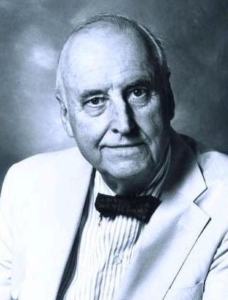 Wm. Theodore de Bary, noted scholar of East Asia and a leader in establishing the role of Asian studies in general education at Columbia College and around the country, died peacefully in his home, Hotokudo, in Tappan, New York, on July 14, 2017. de Bary was responsible for the creation of the Asian Humanities curriculum at Columbia and for the many accompanying sourcebooks and translations (such as Sources of Chinese Tradition) central to that curriculum. Former chair of the Department of East Asian Languages and Cultures and former Provost of the University, de Bary continued to teach after his formal retirement in 1989. He was responsible for moving the Department of East Asian Languages and Cultures to Kent Hall.
Wm. Theodore de Bary, noted scholar of East Asia and a leader in establishing the role of Asian studies in general education at Columbia College and around the country, died peacefully in his home, Hotokudo, in Tappan, New York, on July 14, 2017. de Bary was responsible for the creation of the Asian Humanities curriculum at Columbia and for the many accompanying sourcebooks and translations (such as Sources of Chinese Tradition) central to that curriculum. Former chair of the Department of East Asian Languages and Cultures and former Provost of the University, de Bary continued to teach after his formal retirement in 1989. He was responsible for moving the Department of East Asian Languages and Cultures to Kent Hall.
One of five children born to Mildred and Wilhelm de Bary in Bronx, New York, in 1919, de Bary grew up in Leonia, New Jersey. Entering Columbia College as a scholarship student, he began the study of Chinese as a sophomore in 1938. In 1942, while a Master’s candidate at Harvard, he was recruited by the United States Navy for intensive training in Japanese and served as an intelligence officer during the Pacific War. He achieved the rank of Lieutenant Commander and worked briefly for the Office of Naval Intelligence in 1946. His experiences in Okinawa, Japan, and China during the war persuaded him of the importance of continuing to learn from East Asian cultures. Together with his close friend Donald Keene, he studied under Ryusaku Tsunoda, who had recently been released from an interment camp for Japanese-Americans and who became a revered mentor. In 1949, he was a Fulbright fellow at Beijing University when Communist troops arrived in the city.
While still a graduate student in 1948, de Bary was made chair of a committee charged with extending the undergraduate core curriculum in Western civilizations to include Asian civilizations. He recruited gifted colleagues to join him in assembling a series of source books containing translations of major classical and modern texts of Chinese, Japanese, and Indian traditions. These have been updated and revised on several occasions and are currently used as textbooks by numerous universities throughout the world. More recently, Professor de Bary served as editor for an addition to the series covering Korean civilization and encouraged the development of a companion work on Vietnamese civilization by colleagues at Columbia. He went on to author and edited over twenty books.
His last book, The Great Civilized Conversation: Education for a World Community, was published in 2013. In it, he established links among Islamic, Indian, Chinese, Japanese, and Western classics, emphasizing shared understandings of humanity and shared concepts of civility. Reflecting on history’s great scholar-teachers and what their methods can teach us today, he illuminated the power of The Analects of Confucius, The Tale of Genji, and The Pillow Book of Sei Shonagon as he experienced them in the classroom.
From 1970 to 1978, de Bary served as Provost of Columbia University, where he worked to balance the University’s new endeavors with the values that had inspired him when he first attended the University as an undergraduate. During this time, he raised the endowment for and established Columbia’s Heyman Center for the Humanities. Throughout his career, de Bary believed strongly that undergraduate education was a central mission of the university, and he saw this mission as a responsibility to be shared by all segments of the University. He also worked assiduously to promote studies of the humanities as a necessary adjunct to scientific research and professional education. He believed firmly that the classics were best read and discussed between students and faculty in small groups.
For his scholarship and dedication to human understanding on a global level, he had received the highest awards from the United States, Japan, and Taiwan. He was awarded the National Humanities Medal by President Barack Obama for helping to bridge differences and build trust by fostering a global conversation based on the common values and experiences shared by all cultures. He was also a member of Japan’s Order of the Rising Sun and, in 2016, was honored to be awarded the distinguished Tang Prize from the Tang Foundation in Taiwan for his work in Sinology.
Professor de Bary’s wife, Mary Fanny Brett de Bary, of Northport, New York, and his daughter, Mary Catherine de Bary Sleight, pre-deceased him. He is survived by three of his children, Brett de Bary Nee, a professor of Japanese Literature at Cornell University, Paul de Bary, an attorney and financial advisor in New York, and Mary Beatrice De Bary Heinrichs, a teacher at the Academy Hill School, his son-in-law, Victor Nee, a Professor of Sociology at Cornell University, his daughter-in-law, Stefana de Bary, and her son Alexandru Marinescu, and a son-in-law, William Sleight, of San Rafael, California. In his last years, he was supported by a group of extraordinary caregivers and by his fellow parishioners at Our Lady of the Sacred Heart Church in Tappan, New York.
The department and the university are planning a memorial for de Bary in the early fall.
Please see the New York Times Obituary for more information about his life and work.


